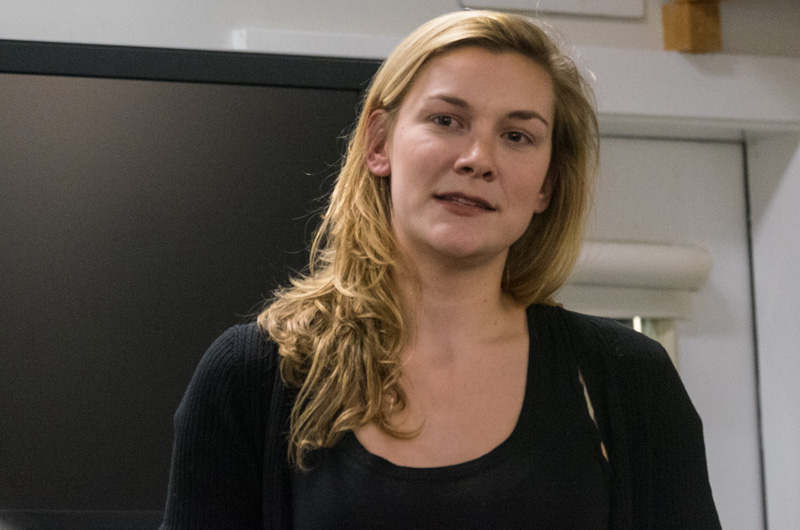On Tuesday evening the West Tisbury Library presented the documentary Zaza Rising, held at Howes House after unforeseen repairs had to be made to the library. The screening was followed by a discussion led by the film’s director, Lena Strothe, a Los Angeles film professional with long-time Island connections, and Pam Putney, a women’s health care specialist and Island resident.
Zaza Rising tells the story of Christine Nyirahabimana, founder and manager of the Duterimbere Cooperative, a women’s collective bakery in the village of Zaza in eastern Rwanda. Through donations, the film also aims to support Ms. Nyirahabimana’s desire to help provide business education for the members of the collective.
Ms. Nyirahabimana was the first in her family to graduate from college. She taught at a local school, but filled with an entrepreneurial spirit she approached Elizabeth Dettke, a fellow teacher from the United States and two-year Peace Corps resident in Zaza, about starting a business. The idea was to employ some of the economically disadvantaged local women, all single mothers and HIV positive.
Ms. Dettke became the film’s producer and helped identify funding sources. She is now back in the U.S., studying social enterprise administration and business as a graduate student at Columbia University.
The women decided on a bakery, seeking advice and training from the Women’s Bakery, an organization helping women in impoverished areas in East Africa.
When asked in the film if this sort of project was unique, Ms. Dettke says, “Starting a business in rural areas is not unique. What is unique in this situation is that this business has a community service component. The project is designed to help the most vulnerable population; that is single mothers with HIV.”
After an atmospheric shot of a sunrise, the film begins by stating: “In Zaza, women are still considered second class citizens. Many have grown up without an education or an expectation of a career. Christine Nyirahabimana has set out to change that.”
Throughout the documentary Ms. Nyirahabimana’s vibrant, analytical and witty personality shines through as she draws connections between social reform and making bread. “The meaning of the cooperative is to be together to make one power,” she says. “The water, flour, the oil, salt, will be mixed to be one.”
The director has designed the film to help the viewer conceptualize Zaza’s rural, remote landscape, it’s natural beauty, and the challenges implied by lack of technology, inaccessible water, inconsistent electricity, sparse fuel and scant transportation. It also showcases the enthusiastic spirit of the members of the community.
The post-movie discussion, led by Ms. Strothe and Ms. Putney, provided insights into the logistics of the bakery, life in Zaza, the filmmaking process and the social implications of the project. Ms. Putney has worked all over the world, most recently in Bangladesh, Cambodia, Ghana, Honduras, Indonesia, Jordan, Nepal, Rwanda and Uganda.
“It is projects like Zaza Rising and the Duterimbere Collective that keep me going,” Ms. Putney said.
One of the ironies Ms. Putney was able to point out is that while Rwanda has universal free, accessible health care for HIV patients, some people are so poor, they are unable to eat properly. When taken without food, the anti-retrovirals can have side effects severe enough to cause people to miss work. While the cooperative members have doubled their incomes since the bakery’s inception, proper nutrition and health is still a factor.
Ms. Nyirahabimana’s zeal is similar to Susan B. Anthony’s single-minded drive, both aware of the big picture while trying to make a tangible change every day. Ms. Anthony is known to have said “agitate, agitate, agitate.”
To view the film, or help agitate by donating to the cause, visit zazarising.com.





Comments (2)
Comments
Comment policy »